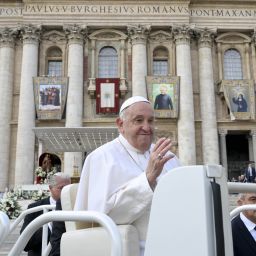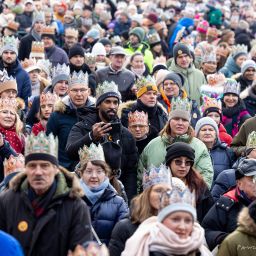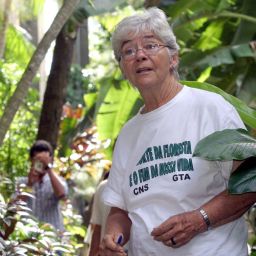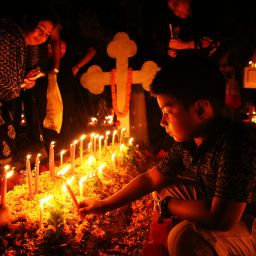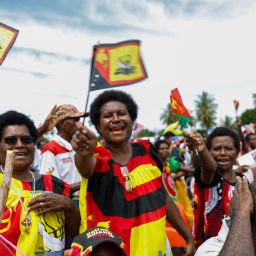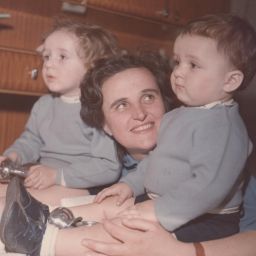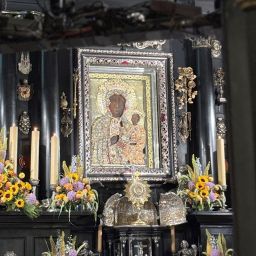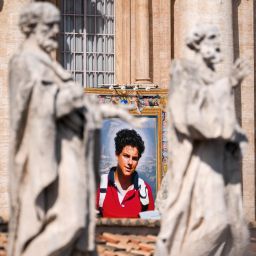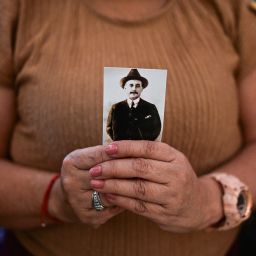By Jonathan Luxmoore
OSV News
WARSAW, Poland — On Warsaw’s Narbutta Street, amid a carpet of autumn leaves, a neoclassical building stands between bare birches, fronted by a solitary statue of the Virgin Mary.
In late October, while thousands gathered across the Polish capital to commemorate the 1984 kidnapping and brutal murder of Solidarity chaplain Blessed Jerzy Popieluszko, patient work continued at the Jesuit order’s archive in Warsaw to document the fate of other communist-era victims.
“Since the files were collected from various Jesuit centers, around half have been inventoried — the rest still need sorting for historians,” explained Jesuit Father Krzysztof Dorosz, the archive’s director.
“In today’s fast-moving technological world, it’s sometimes hard to tell truth from fiction. But it’s also important to remember not everything is on the internet. Though archival work can be arduous, it can also throw up significant discoveries,” he said.
Blessed Popieluszko, 37, was killed by secret police agents enraged by his defiant human rights homilies, and he was beatified as a martyr in June 2010.
Though famed worldwide, however, the priest was only one of many who died for the faith under communism.
Another, Jesuit Father Wladyslaw Gurgacz (1914-1949), was even younger when, branded a “bandit priest,” he was shot at Kraków’s Montelupich prison after serving as chaplain to one of the partisan groups resisting the postwar communist takeover.
Father Gurgacz’s letters and notes, rescued by a fellow Jesuit, are being readied for publication at the archive, in cooperation with Poland’s official Institute of National Remembrance, known by its Polish acronym IPN.
“He belonged to a tragic young generation who, not realizing the hopelessness of their situation, utterly rejected communist power and counted on holding out until a new Poland emerged,” Father Dorosz told OSV News.
“Like Father Popiesluzko, he was a pastor of personality and charisma who, despite poor health, drew people to the Church, speaking simply and directly.”
Father Gurgacz joined the Jesuits at age 17 and was ordained in 1942 at Poland’s Jasna Gora national sanctuary, working as a hospital priest and chaplain to the Sister Servants of Mary Immaculate. After the tragedy of World War II, like millions of Poles, he hoped to breathe the air of freedom — only to fall under murderous repression of communist rule that lasted for the next 50 years.
After the war, the priest enlisted with the Polish Underground Independence Army, operating in the hills around Krynica.
He was arrested in July 1949 after a manhunt by the paramilitary Urzad Bezpieczenstwa, the notorious Security Office UB.
Plans to broadcast a military show trial on state radio were dropped when the Jesuit refused to ask for mercy, insisting his actions were “in line with what millions of Poles are thinking.”
Witnesses testified that the priest, sentenced to death with two Underground Army comrades, was killed by two shots to the head in the prison courtyard on Sept. 14, 1949.
Posthumously exonerated in 1992, Father Gurgacz was reburied with state honors in September 2021 at a Kraków burial ground reserved for Poland’s “doomed soldiers,” who had continued resisting communist rule until the 1960s.
The Jesuit archive where Father Gurgacz’s dramatic story is documented is one of many Church collections still being cataloged.
“To establish definitively what happened in many cases, we’d need access to Soviet archives in Moscow, and these remain closed,” Rafal Latka, a historian at Warsaw’s Cardinal Wyszynski University, told OSV News. “But these Church archives are supremely important, and we hope more will be opened up, enabling research to progress.”
Communist rule lasted from 1917 to 1991 in the Soviet Union and enslaved Eastern Europe after World War II, unleashing the greatest wave of persecution since the first Christian centuries — a reality some Catholics think the Church has been slow in acknowledging.
Barely a hundred communist-era martyrs have so far been beatified, compared to more than 2,000 from the 1936-1939 Spanish Civil War and hundreds more from other modern anti-Church campaigns.
In Poland, where another murdered priest, Father Michal Rapacz (1904-1946), was honored this way on June 15, the Church is seeking the beatification of dozens of communist-era victims.
The Church also hopes for the canonization of Blessed Popieluszko. The Oct. 19 anniversary of his murder was marked by a National Remembrance Day for Steadfast Clergy, and a memorial march and Mass with an address by President Andrzej Duda.
To date, however, there’s no word as to when more martyrs might be recognized, or how much support will be given to researching their inspirational stories.
Back at Nabutta Street, work on the archives nevertheless continues.
Father Dorosz’s Jesuit order is no stranger to suffering.
At least 10 members served as chaplains in the bloody 1944 Warsaw Uprising, many leaving letters and diaries, as did Polish Jesuits incarcerated at Nazi concentration camps, while Father Adam Sztark (1907-1942) was shot by the German Gestapo and posthumously honored by Israel for sheltering Jews.
In the worst case of all, 16 Jesuit priests and lay brethren were massacred with 14 other Poles when Waffen-SS troops locked them in a tiny monastery basement on Warsaw’s Rakowiecka Street and tossed in hand grenades in August 1944.
Witness accounts from the few who escaped are also housed in the archive, along with letters and testimonies from other priests active under communism — such as Father Stefan Miecznikowski (1921-2004), who ran a help center for families of interned Solidarity members.
“Father Gurgacz was murdered at the height of repression, when physical violence was used against priests, whereas Father Popieluszko died in very different circumstances, when communists were making a show of goodwill towards the Church,” said professor Latka, the Catholic historian.
“But we should remember three other opposition-linked priests were murdered as late as 1989, the year democracy returned. All such pastors were denounced as engaging in politics by communist propagandists, whereas they were really struggling for truth, justice, and freedom,” he said.
Cutline for featured image: A casket with the body of Father Jerzy Popieluszko, Solidarity’s trade union chaplain in communist Poland, is carried during his Nov. 3, 1984, funeral in Warsaw. The priest was murdered by Sluzba Bezpieczenstwa secret service agents Oct. 19, 1984. After being abducted, he was severely beaten, his body tied with ropes and thrown into the Vistula River. On Oct. 30, 1984, his body was dredged from a Vistula River reservoir. Pope Benedict XVI recognized Father Popieluszko’s martyrdom Dec. 19, 2009, and he was beatified in 2010. (OSV News photo/courtesy Institute of National Remembrance IPN)

